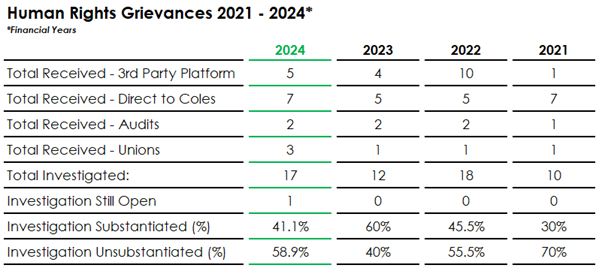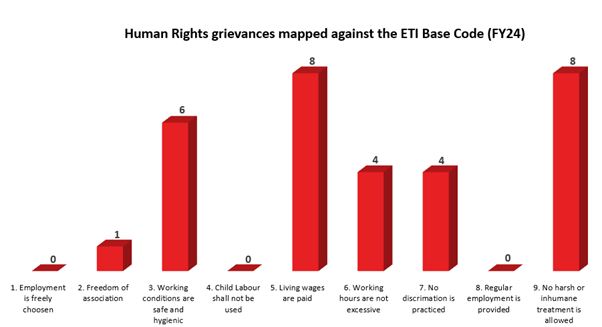As part of our broader human rights strategy, in line with the United Nations Guiding Principles (UNGP), we are committed to providing an effective and accessible grievance mechanism to receive and manage concerns that may impact individuals within our own operations and supply chain. This is fundamental to ensuring that all people, internal and external to Coles have an avenue to raise their concerns.
Coles respects the rights of individuals and human rights defenders to confidentially and/or anonymously raise complaints or concerns without fear of retaliation. Coles will not tolerate retaliation, intimidation, harassment, discrimination, or victimisation against any individuals, organisations or their representatives who raise concerns, and will act against any parties who engage in any manner of retaliation. Coles is committed to protecting the rights and wellbeing of individuals who raise a grievance through our mechanisms. When a grievance is raised in good faith, the reporter will not face adverse consequences, even if they were mistaken about the concerns. Alongside this commitment, eligible reporters are protected by the law.
Coles provides a channel for individuals, both within our own operations and supply chain, to raise concerns via Coles STOPline or through Coles’ Protected Disclosure Officers. Grievances may also be raised through our other channels including directly to the Ethical Sourcing group email inbox, third-party stakeholders such as unions and non-governmental organisations (NGOs), media or via Coles’ third-party audit program. Beyond our own operations and supply chain, these channels are also available to any affected stakeholders including those external to Coles such as community members where adverse impacts have been caused by, contributed to, or directly linked to Coles.
Coles communicates the available channels through various methods, including via regular supplier training, posters in Coles’ lunchrooms, in-house training with relevant team members, worker education events, unions, through our audit program (auditors are given business cards and posters), the ethical sourcing team site and via policies.
Coles’ Whistleblower PolicyWhistleblower Policy, View PDF, file size 270KB encourages reporting of any suspected unethical, illegal, fraudulent, or undesirable conduct within our own operations and supply chains, including suspected adverse impacts on people, communities, or the environment.
All human rights grievances raised through any of these mechanisms will be addressed and assessed through our Investigation Protocol or Modern Slavey Incident Protocol, dependent of the severity of the grievance raised. Since grievances can vary in complexity, geographical location or severity, our protocols may be adjusted depending on the circumstances. However, where possible, we aim to complete our preliminary review of the grievance and acknowledge the reporter within 14 days. Coles endeavours to conduct a comprehensive investigation without delay and will also share the outcome of the investigation with the party making the complaint.
Using any of Coles’ grievance mechanisms channels does not prevent reporters from accessing other remediation processes. Coles’ is committed to supporting access to state-based judicial or non-judicial mechanisms (it is not required for the reporter to waive their legal rights) and will collaborate to ensure a fair resolution of the grievances raised. If required, we may ask the reporter to maintain confidentiality during the investigation to preserve the veracity of the investigation, however, there is no requirement that they accept confidentiality provisions (for example non-disclosure agreements). We also support the work of and are open to working with the Australian National Contact Point (AusNCP).
Managing grievances
All human rights supply chain grievances are managed and investigated by the Coles Ethical Sourcing Team. When necessary, an independent third-party will be used to investigate. Additionally, the Head and Group Ethical Sourcing Manager are updated on all investigations regularly, the Coles’ Board are updated on a quarterly basis, and all investigations are reported in the Modern Slavery Statement annually.
Since the establishment of the ethical sourcing program, we have investigated over 80 grievances; this excludes the thousands of non-conformances also reviewed and closed annually through our audit program. Additionally, through STOPline, we have received over 700 grievances from our own workers in FY24, these are managed and investigated by our P&C function.
Below is a breakdown of the method used by reporters to raise their human rights grievances in the past financial years:

To enable improved visibility for the Ethical Sourcing team, additional monitoring will be conducted of in-scope sites who are subject to partially unsubstantiated or unsubstantiated investigations. Specifically, relevant site(s) will be added onto a ‘watch list’, that will have enhanced due diligence checks conducted by the Coles’ Business Protection team. Additionally, the Ethical Sourcing team will conduct annual site visits if appropriate.
To better understand the most frequent areas of concerns raised via our grievance mechanisms, all grievances are mapped against the ETI Base Code. The mapping enables us to focus on the areas of concern, assisting us to tailor the type of support required for our suppliers (for example tailored training). This monitoring has enabled us to strengthen our processes to ensure we have the right systems in place to handle all grievances raised, for instance; we have developed a Modern Slavery Incident Protocol (see modern slavery statement for further information) and an Investigation Protocol.

The most frequent areas of concern raised are accommodation standards, excessive deductions, and workplace bullying. A table of all human rights related grievances received from the supply chain, is available hereHuman Rights Complaints, View PDF, file size 85KB.
Suppliers
It is important to Coles that our suppliers share the same commitment as Coles in ensuring that workers, persons acting on their behalf, community members and any other stakeholders in their supply chains have effective and confidential mechanisms to raise grievances in their local language. Therefore, we expect our suppliers to communicate with and put in place policies and management systems to ensure that, their own suppliers and sub-suppliers involved in producing or supplying Coles’ products or services, adhere with these requirements.
We understand the challenges associated with providing effective and accessible grievance mechanisms, particularly due to socio-cultural and language barriers. When suppliers provide their own grievance mechanisms, we expect them to consult potential or actual users on the design, implementation, or performance of their mechanism to ensure effectiveness and accessibility to the individual it is targeted at. To support suppliers’ knowledge on grievance mechanisms, Coles in FY25 held an online webinar providing practical approaches how to implement, embed and review the grievance mechanism they have in place. The training is available here.
Assessing the effectiveness of our grievance channels
We understand the importance of ensuring our grievance mechanisms are effective, in line with the expectations set out in the UNGPs. Effective grievance mechanisms should be: trusted, accessible, communicated, predictable, equitable, transparent, rights compatible, a source of continuous learning and based on engagement.
To ensure we are assessing the effectiveness of our own grievance mechanisms, in FY24 we completed a full review of our grievance tool against the expectations outlined by the UNGPs. The review was done in conjunction with several stakeholders including suppliers, supply chain workers, internal teams, unions, NGOs and industry specialists. This engagement has led to the final design of the Ethical Sourcing STOPline grievance mechanism, which has been adapted and updated based on the observations and analysis of interactions (this included interviews, meetings, roundtable review, trial grievances raised, and training) with different stakeholders as listed above.
The following changes were made following the review and interactions:
- We aligned to one third-party grievance mechanism (STOPline) for all individuals, including those in our own operations, our supply chain, and the community
- We developed a visual poster with more pictures than words, to aid in advertising the grievance mechanism for workers in our operations and supply chain that have limited English
- We developed a specific QR code for workers in our operations and supply chain to raise their grievances, offering multiple languages in a simplified form
- We developed an Investigation Protocol, so there is a documented process to follow to ensure adequate steps are being taken for each grievance raised
In addition to the changes above, in FY22 Coles invested in an experienced investigator to strengthen the process of how grievances are managed which included consistent follow-up with reporters to provide progress updates on the cases.
Grievance channels
In Coles, grievances can be received through various channels, below we describe the most utilised channels:
Coles STOPline
Coles STOPline is a confidential service run by an independent third-party that all stakeholders within Coles’ own operations and supply chain, including team members, suppliers, workers, contractors, and community members can use to raise concerns or make complaints. It can be accessed in multiple languages with translation available on request and a language setting within the Mobile App or via the QR code.
As part of the above review, we developed a separate process flow chart to help demonstrate how complaints raised via STOPline are received and handled by Coles. Importantly, the flow chart explains how the reporter is informed throughout the process, which allows them the opportunity to withdraw the complaint if they wish to do so and to challenge the process or outcome if they are not satisfied.
Audits
Ethical audits assess modern slavery risks in a range of ways, including through document reviews, site tours and private and confidential worker interviews. Worker interviews in particular provide an opportunity for individuals to raise their concerns in a confidential manner.
Direct to the Ethical Sourcing Team
Individuals can directly contact the Ethical Sourcing Team to raise any grievances related to human rights or labour conditions. Contact details are provided here on our website and throughout our supply chain communications.
Protected Disclosures
A number of persons are able to receive protected disclosures under our Whistleblower Policy. This includes nominated Protected Disclosure Officers and officers such as a director or secretary, or senior managers of the Coles Group. Their contact details can be found in the Coles Whistleblower Policy.
Third party organisations
Grievances are also submitted to Coles through trusted third parties, including unions, and NGOs. These parties play a vital role as they are ‘on the ground’ advocates for workers. We ensure all grievances raised via third party follow the same process.
Remediation
Where a legitimate concern or issue is raised through one of our grievance mechanisms or identified as a result of a Coles or third-party audit, we will seek to work with our suppliers, government and worker representative bodies or other non-profit organisation to ensure appropriate remedy is provided.
When applicable, a corrective action plan with a timeline and monitoring plan is assigned to the applicable party, including the person responsible, to ensure all issues identified are remediated. In some cases, a third-party may be used for support with monitoring the implementation of corrective action plans.
In all instances, we will seek to place the affected person’s needs first and appropriate remedy will be determined on a case-by-case basis. Our Ethical Sourcing Remediation RequirementsEthical Sourcing Remediation Requirements, View PDF, file size 246KB provide information on remediation methodology and potential remediation actions that may be undertaken.
If no outcome is forthcoming within a reasonable time period and the investigation has been thorough and all options have been exhausted, Coles reserves the right to exercise its rights under the relevant supply or services agreement which may include suspension of orders or termination of the agreement where compliance with the Policy and Program Requirements is not rectified. This is done in conjunction with several stakeholders including, the reporter, the Head and Group Ethical Sourcing Manager and any relevant business units.
